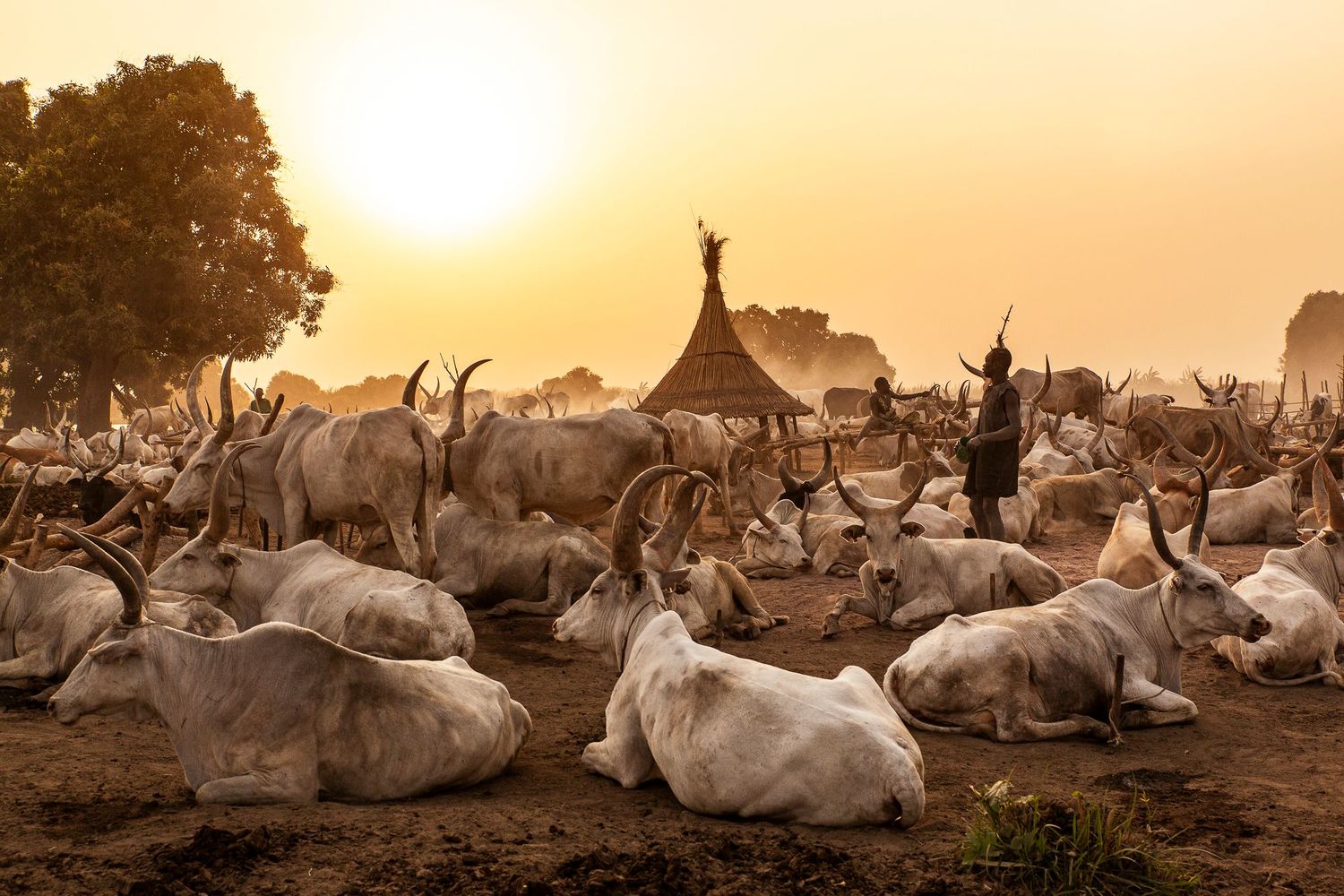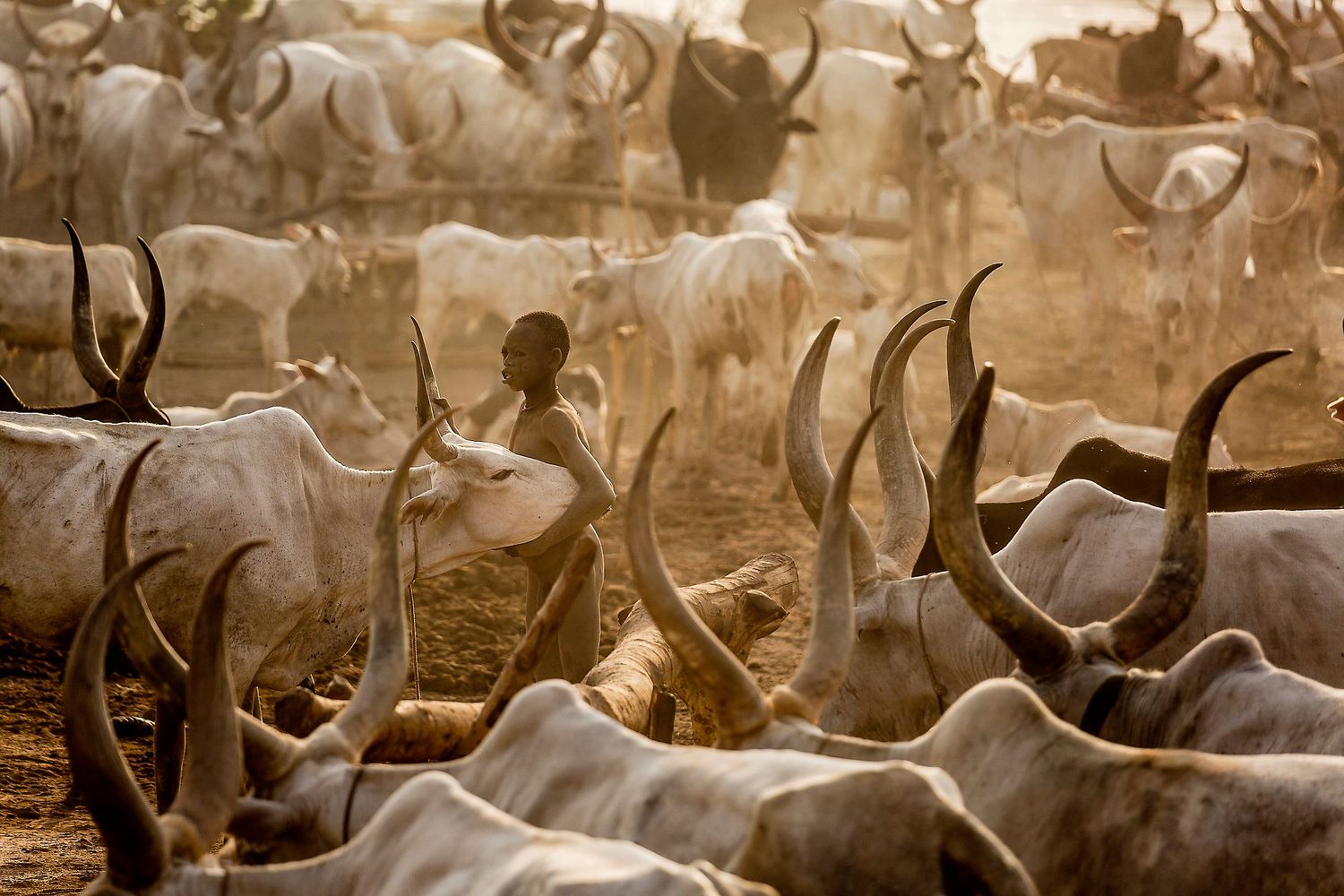On the banks of the Nile, just north of the South Sudanese capital of Juba, dawn breaks on a Mundari cattle camp. A young man begins his morning ablutions. After cleaning his teeth with a stick, he lowers his head under a urinating cow, tethered to a post nearby. His impromptu shower will ward off infection and has the added benefit of dyeing his hair orange.

Next he rubs the peach-colored ash from last night’s dung fire into his own skin as well as into the hide and curved horns of his cattle. With the consistency of talcum powder, the ash is a natural antiseptic and mosquito repellant and offers man and animal protection from the intense heat. He sucks fresh milk straight from one of his cow’s udders, and then bangs a drum to alert the rest of the tribe. It is time to take the animals to graze on new pasture.

The tribes of South Sudan are among the
tallest people in the world, and many Mundari men and women tower over their
cows and bulls. Known for their distinctive ritual scarring of Vs on their
foreheads, the Mundari have a strong tradition of wrestling and music, and they
live communally—sharing everything from blankets to instruments. They depend
on their cattle for survival, and will only slaughter or sell them in times of
dire need.
Now might be one of those times of need. Five years after South Sudan gained independence, the oil-rich region is in the grip of a humanitarian crisis. Conflict broke out in December 2013, when President Salva Kiir accused his former vice-president, Riek Machar, of plotting a coup. The subsequent fighting tore the country apart along sectarian lines, with supporters of Kiir, who is ethnically Dinka, pitted against those backing Machar, the Nuer people.
A peace deal signed in August 2015 was supposed to end the fighting, but implementation has been inconsistent, and although Kiir recently restored Machar to his post as vice-president, he has not yet returned to the capital to take up the role. Meanwhile, 2.3 million people, one in five of the country’s total population, have been forced from their homes. In addition, 2.8 million people are facing famine.
Despite the hardships, the Mundari people continue to treasure their herds of Ankole-Watusi cattle. The best specimens of this sought-after breed, known as “the cattle of kings,” are protected with zeal. The most impressive individuals have horns that can reach 8ft long, and the Mundari proudly decorate their biggest bulls with tassels.

“Every Mundari man I met had his favourite cow,” says Zaidi. “It is his most prized possession and a reflection of himself.” For the Mundari, their cattle are a form of currency and a status symbol; they also form a key part of a family’s pension or dowry. Since the end of the civil war, thousands of men have returned to South Sudan looking for wives, which has pushed up the “bride price”—making these animals even more precious.
This increased value has drastically increased the number of lethal cattle raids. Each year, about 350,000 cows and bulls are stolen and more than 2,500 people are killed by cattle rustlers. With a single cow or bull worth up to $500, it’s not surprising that Mundari men stand watch over their herd with rifles—this despite a recent attempt by the government to disarm warring tribes. “Their cows are the most important thing in their lives,” says Zaidi. “And they will protect them at all costs.”
—LensCulture
Editors’ note: Zaidi has also made a video about the Mundari people. You can find it here.
The cover image of this series was chosen as a finalist in the LensCulture Exposure Awards 2017—don’t miss the work from all 44 of the outstanding, international talents!
If you enjoyed this article, you might also like these previous features: The New Nation Makers of South Sudan, a look at the emerging leaders of the country; Shepherds, a series on a shepherd community in Slovenia that is changing its ways after 500 years; and The Outsider, a look at life in the otherworldly landscape of Mongolia.














